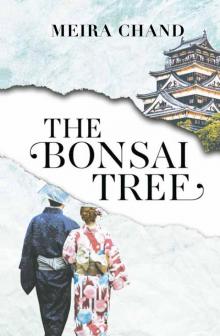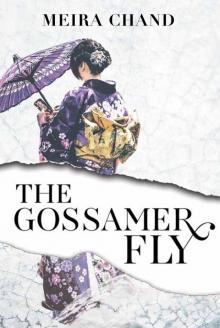- Home
- Meira Chand
The Gossamer Fly Page 3
The Gossamer Fly Read online
Page 3
Standing beside the breakfast table, Frances Akazawa stopped talking as Hiroko knocked. Coming in with a tray of tea, Hiroko placed it on the table, and gave a small bow to Kazuo sitting there. He returned a curt nod, but noticed the thick fold of lid against her cheek, and her neck, smooth inside the collar of her blouse. As she left Frances began to speak again.
‘I insist it is to be kept in the study, upon the wall. It is not to be touched. It is a dangerous weapon. You know how I feel about such things.’ She faced Kazuo squarely.
Stretching out calmly, he took a slice of toast from the plate, and Frances’ voice rose sharply. Natsuko stood behind her mother. It had been impossible to hide the scratch. Although not deep it had needed some attention.
‘That sword is too old to be sharp. Besides he is a boy. You know you take the wrong attitude to things here. I was brought up to understand the responsibilities of being a man.’ Kazuo buttered toast, and refused to look up. Beside him at the table Riichi reached for some cereal.
‘I no longer care about what you consider right or wrong. I’ve tried all these years to understand, you know that. But it’s all back to front as far as I can see. It’s unethical and horrible deliberately to direct a child’s mind to things of violence, and at so young an age. I cannot take any more of anything here. And God knows, I’ve tried.’ Her voice rose to a strident squeak.
Holding her mother’s hand, Natsuko kept her eyes on the carpet. Anxiety twisted inside her. It was always like this, her mother hysterical, her body tense and hard, throwing words before her like chipped stones. And her father, impenetrable, holding his stance until her mother became soft and tearful. She hated it all. She held tighter to her hand and concentrated on pale flecks of wool in her mother’s skirt that surfaced in little pebbles the colour of wet sand. Clenched about Natsuko’s fingers, Frances’ hand showed a whitening across the knuckles.
‘There is nothing wrong as far as I can see. You’re just getting hysterical.’ Kazuo spread marmalade upon the toast. Natsuko watched it mix with the melted butter.
‘But he might have killed Natsuko. Who knows what all this may lead to. I will not have it. Do you understand? I cannot bear any more. You just don’t care about my feelings.’ She pulled her hand free of Natsuko, and as she sobbed the pleats of the sandy skirt moved lightly.
At the table Riichi looked questioningly at his father. Frances’ sobs filled the room, bitterness congealed in her face. Kazuo looked at her, pursing his lips, a muscle throbbing below his cheek. He turned to Riichi.
‘Do not take it again from the study.’ The words spat from him harshly.
‘Are you satisfied now?’ Kazuo threw the sentence at Frances, hard and flat. It clattered in pieces about them all.
Riichi looked at Natsuko, his eyes full of bitterness. And she knew then she was not mistaken, there was a difference in Riichi. It had begun on New Year’s Eve. Nothing she might say could define it clearly. But Riichi had changed. The difference was something inside him, something she could not see. She looked at the four of them then, and saw the dark emotions crashing between them. She clutched tighter at her mother’s skirt and sobbed with fear and consternation.
In their bedroom that night, Kazuo tried again. The quilt was pulled high about Frances’ shoulders; she lay with her back to him. Under the covers he moved his arm, until his hand rested across her belly.
‘You should not feel as you do. You have lived here so long now. You understand the culture. Wherever I can I have adapted to your ideas, more than most men here would. But there are things Riichi must learn, from my side as well as yours.’ He said it gently, meaning it. Pushing down the blankets a little he moved his hand up, cupping her breast. Immediately she tensed.
‘No. Please. Not now.’ She pulled away.
‘For God’s sake, Frances, what more do you want me to do? Do I behave in the way other Japanese husbands do? How many times have I gone out, after work before I come home, to a bar, as most of my colleagues do? They think me an oddity. In the beginning they made fun of me. I never told you, but I’ve put up with a lot for your sake.’
They had met and married in England, and their relationship was on quite a different footing from those of his friends who had never left Japan, and married women of their own kind. Kazuo had studied at London University, and worked for a while with UNESCO in London, where he met Frances, who was an accountant with the same organisation. He understood Frances’ cultural ideals. But he wished she would stop fighting the society in which they now lived. He wished she would sympathize, even if she did not always agree, with the Japanese point of view, and leave it at that. But she refused to accept that every sphere of life, every situation and each age had its own code of behaviour. Life was filled by contradictions, man must be allowed the disguises of the chameleon, to adapt to each separate situation. Complications resulted if these different spheres and their codes of behaviour were mixed. But Frances would not have it.
She had not got over his father keeping a mistress. He knew, secretly, she lived with the fear of him doing the same. Her horror had never subsided at the discovery that the bills for his father’s philandering nights came home to his wife to pay. Yet Kazuo, in his childhood, accepted that the province of wife was entirely fenced off from the province of erotic pleasure, that each sphere was equally open and above-board that each gracefully accepted the other. His mother had sometimes dropped remarks that made him realize she was not entirely happy with this state of affairs. But she was always cool and dignified, helping his father dress for his evenings, tending him when he came home in a drunken state. She knew her place.
Once, he had seen his father’s mistress. It was the day his grandmother had taken him to see the Kabuki. It was the season of the Kaomise in Kyoto. All the best people went there. It was the first day, the geisha were turned out in force with their patrons. His grandmother was very annoyed they had only been able to obtain seats at the back of the stalls, but Kazuo was small and impressed by it all. And in those days the performances had been gracious and lavish. The audience was not the crowd they were now, with their casual clothes, cheap disposable lunch boxes, and throw-away plastic pitchers of green tea. Then it was silk and brocade and pinstriped suits, many of the men still wore kimono. Lunch was served from tiers of painted lacquer boxes, the tea was in china bowls. He never knew if his grandmother realised that his father was also there. She did not take note of things she did not wish to see.
There was a tall pile of the painted lacquer boxes balanced on the knee of the woman beside his father. She handled them deftly, serving delicacies of every sort to his father. She was young and pretty, much prettier than Kazuo’s mother. But her manner did not seem as cool and dignified, and Kazuo noticed at the neck the kimono dipped to an immodest low. And even from their seats he could feel, below the propriety of public behaviour, an informality. His father would sometimes lean towards the woman, or she would laugh coyly behind her hand, after giving his father a little push. Kazuo had always observed a great display of formality between his parents. Even within the most intimate circle of family life he had not once seen an erotically affectionate gesture. From the back of the stalls Kazuo had watched intently. It was clear the relationship here was very different from the one his father had with his mother. But he did not remember feeling outraged, only intrigued, and underneath in some way profoundly excited.
Kazuo stared resentfully at Frances’ sullen back. It was always the same. Even those times she reluctantly made love left a residue of sourness between them. He turned and let her alone, unwilling to coax her. She huddled deeper beneath the covers, back to him, knees drawn up, her hair spread lankly behind her on the pillow.
It had irretrievably fallen apart. He could see that. She had lost the will to go on. He no longer knew how to try. Because he understood something of the difficulties she faced, of custom and culture, they had moved from his parents’ home as the children began to grow. They came here, to this large
, Western-style house on a hillside above Kobe. He found it too upright in every way. But it was what Frances wanted. Yet, even after they moved, nothing seemed to please her. He watched bitterness grow inside her, and remembered the very abundance of her that had first attracted him. The swingy walk, the smile, the way of flicking her hair. Now flesh hung upon her in a disappointed way, her neck was thin and taut, held in a defensive position. At times he felt guilty, knowing he could not meet her expectations. Even the thought of trying tired him. Sometimes he was certain of the mistake, to have ever brought her here. Then again it seemed her own doing, for she should have adapted, have made more effort, he said to himself. Instead, growing older, she clung the more impassively to her own opinions and ideas. She said she must retain her identity. He was tired of it all.
Stretching out he switched off the light and settled down, his back still to Frances. And for a moment the woman, Hiroko, came into his mind. He saw again the thick, lazy fold of lid against the cheek. He knew the kind of woman she was; Frances had not judged wrongly. She was the sort who would give a man whatever he wanted. She would do anything. Anything.
3
It was not the first time. Once before it had happened. Somebody brought her home in a taxi from a department store in Kobe, after she collapsed at the bottom of an escalator, sobbing. In the first aid room they got no sense from her. That time a shopgirl brought her home. The doctor, when he came, found little wrong, prescribed a tranquillizer and a day in bed.
It was a phone call this time, from a pinball arcade. The telephone number had been found on a card in her handbag. In his study Kazuo Akazawa laid down the article he was writing for an American magazine on Bushido, the old samurai ethical code, and drove into town to fetch her.
Sitting in a small pale blue rocking chair by the window in her bedroom, Natsuko listened to her mother sobbing in the next room. On her lap she pulled at the dry blonde hair of a doll, hating its matted texture that could never be combed. As it rocked gently on her lap its eyelids lifted lazily a fraction, and closed, over and over again. Angry suddenly at its unbreakable face, she began moving frantically in the chair, the muscles of her body hard and tense, pushing back and forth. And the eyes on her lap snapped open and shut with a light clicking sound, the glassed velvety iris stricken and wide. In the next room the sobbing went on. Outside the sky was pale and flat, without cloud or colour. The bare branches of a willow tree unravelled like tangled wire. She wished she did not feel compelled to sit as she did, listening, waiting.
She knew her mother went to those places, playing the pinball machines for hours. Once Natsuko went with her, and could not understand what kept her there. Until that day she had only seen the pinball arcades from outside, the gaudy lights and raucous noise.
She remembered there were three of the places, one after another, taking up most of the block, all rooted under massive, garish film hoardings. Thinking of the fencing academy she wondered why the noise did not affect her mother. For even on the pavement outside the glass doors, the loud metallic beat of the pin balls pushed out. And the sheer thunder of it all inside, had terrified Natsuko. Wild bumping balls, rattling, rolling, pinging through holes in row after row of machines, and above it all piped rock music, blaring away. Lights winked from machines and raced, in a constant chase around the walls. Across the ceiling were massed fairy lights and boughs of shiny, plastic red maple leaves. For then it had been Autumn, maple viewing time in the shrines and hills. But her mother sat there, before a blue machine, fixed and dead to Natsuko’s presence. In the window of the thing a brightly painted face grinned out, wide, toothy mouth, popping eyes, red cheeks, a little black hat with a purple feather. Holes filled the eye pupils, the nostrils and missing teeth. While the machine was in use the head bobbed cheekily up and down. In a corner of the frame was a hand with a gun, and from outside a lever pinged bullets at the head. Natsuko saw not just one, but a whole row of identical machines, with identical heads, hands and guns. All the way down the row the moronic grins and little hats with purple feathers bobbed up and down. Natsuko hated the noise, the garishness of it all, and the feeling of aimless despair. In this pulsating cell everything disintegrated. All the darkness of past and future receded, lost hopes roller-coasted upon the silver balls, until they burst in jackpots and laughter. On a stool beside her mother Natsuko prayed for it all to stop, if only for a moment. The continual roar, the speeding machines, and the terrible smell of cesspools and orange juice.
On the next machine to them was a man with a shaved head, the pale skin of his skull showing beneath a growth of bristles. He wore a gaudy, Hawaian shirt over a knitted woollen stomach warmer, and on his bare feet wooden Japanese clogs, with stilted ridges several inches high. She knew he was a gangster. Riichi was always pointing them out. The man focused a wide derisive grin at them. It was then she noticed other people staring at them also. When they were not concentrating on the machines women stared at them and giggled, men laughed. She was sure they made rude jokes about her mother in this place. But Frances seemed oblivious.
She sat, pulling the lever, pressing coins into the slot, firing again and again. From the blue frame the face grinned out, its neck a thin white stick. Mostly the balls just pinged the blank areas of cheek and forehead, but once or twice they shot through the holes and fell with a hard plop on the other side of the head. Then a red light flashed on top of the machine, a bell rang and a handful of discs fell into a metal cup. These Frances could exchange for cigarettes, sweets or a variety of prizes.
As the discs spilt out, clinking into the metal cup Frances turned and smiled at Natsuko, reaching out, squeezing her arm. Natsuko was apprehensive. At home her mother did not smile, her face was always shuttered. Now, scooping up discs, her eyes were bright, her expression determined. She pushed the discs into her pocket and Natsuko thought, now it must end, now it must finish. She stood up to leave, but Frances was pulling again at the machine.
Desperation came down upon Natsuko then. The noise grew uncontained around her. She tugged at Frances’ arm, beginning to cry. Her mother stood up reluctantly at last, and they left the dreadful place.
Outside, sun cut through the narrow spaces between tall buildings, splashing the jumble of advertisements, windows, traffic and people. To Natsuko this was serene after the world inside the pinball arcade. Yet her mother stood in a dazed way in the street, and seemed not to know which way to go, her face tight and blank again. In the end Natsuko had taken her hand and walked towards the bus stop.
‘But why? Why must you go to places like that? And what for?’ Kazuo sat on the side of the bed, leaning over Frances. Although he tried, her swollen face aroused only a guilty disgust in him. He hoped nobody who knew them had ever seen her go in or out of the place. It was a shock to learn she went there.
‘I’ve only been sometimes, when I felt too bad.’ Her voice was thick and nasal.
‘But why?’ He could not help the raised tone of his voice, the cold exasperation. He felt he had endured enough.
‘I don’t know. The feeling I might win …’ Frances sobbed, refusing to look at him.
‘But there is little money to it.’ He was glad she was ashamed. Suddenly he hated her so much, he just wanted to shake her and shake her, until her body fell apart, and he would be left alone, in peace, without her at last.
‘Not in that way … oh … you would never understand. Everything stops there, only the moment you stand in exists … and ahead, anything is possible, even a jackpot. And it’s me … me who can do it. How could you ever understand? You get everything you want, it all goes your way … nothing in life evades you, you would never understand!’
‘No. I don’t. What happened to you there?’ he said sharply, afraid suddenly of the fierceness inside him.
‘I don’t know. I can’t remember.’ The sobbing started again.
‘You must remember.’
‘I couldn’t do it right. The machine wouldn’t give a damn thing. God, I was angr
y. Angry.’ She screamed the words out, sobs gushing up from her again.
‘All right. All right.’ It frightened him, this hysteria. It aggravated his anger, making him afraid he really might lash out and hit or choke her. He patted her arm, trying to calm them both.
‘Then they started laughing at me. I could feel them, hear them. Everyone was laughing at me. And the noise of it got louder and louder. All of it. The music, the machines, the laughter. Everything. It was terrible. I thought it would crack my head. Then I don’t remember anything until you came.’
She took off her shoes, they told him, hitting the machine again and again with the heels, flailing at it with hands and feet, screaming and sobbing. They were on the verge of calling the police when they found the telephone number in her bag.
The noise, the lights, the thick human smell of the place had overwhelmed him when he went to get her. Frances was kneeling huddled and sobbing on the floor. He was ashamed at having to own her. But she had come with him easily enough, suddenly quietened and dazed at the sight of him.
Now, exhausted and blotched, her face stared up at him from the pillow. Mascara blurred her eyes, making them round and black and ghoulish. Tears rolled into her hair, soaking the temples, pasting the strands together. He felt only despair at the sight of her, and pity for himself. Standing up he walked to the telephone. She needed a doctor. He knew now she was ill.
From the window in her parents’ bedroom Natsuko watched the next day. Frances and Kazuo bent under the twisted fir tree arched over the gate, going to the hospital. Only from this window was the view clear, of the garden, the gate and the hill beyond. But she hesitated to come into the room alone, knowing she would feel Hiroko here, see her spread out on the bed again, the yellow dress across her, the wild eyes and open mouth, her dissolute body.

 The Bonsai Tree
The Bonsai Tree A Choice of Evils
A Choice of Evils Last Quadrant
Last Quadrant Sacred Waters
Sacred Waters The Gossamer Fly
The Gossamer Fly The Painted Cage
The Painted Cage House of the Sun
House of the Sun